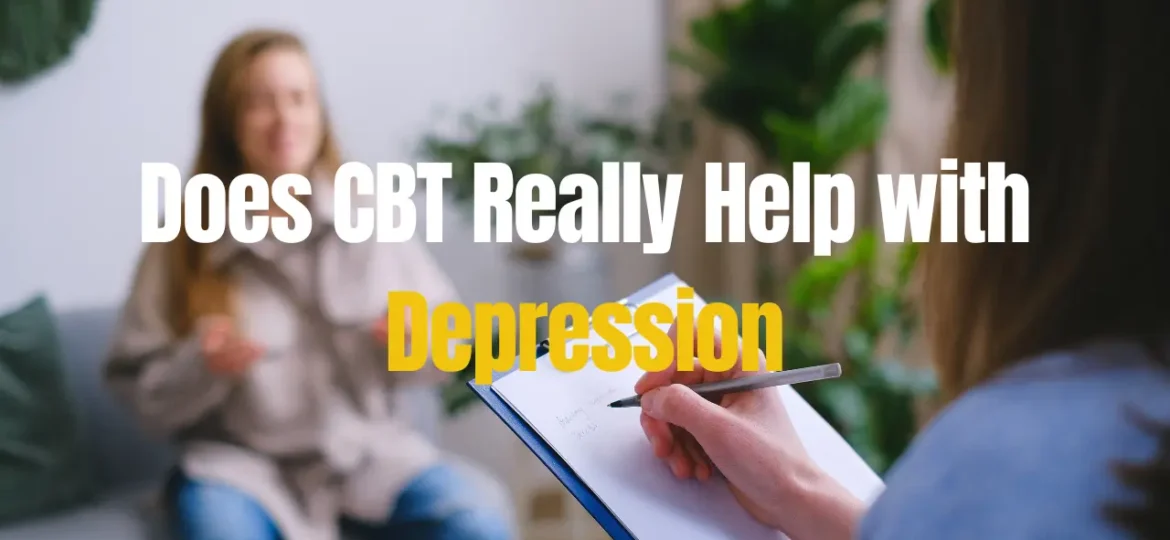
Depression is a complex and often debilitating mental health condition that impacts millions of people worldwide. For many, it can feel overwhelming and unmanageable, making daily tasks seem insurmountable. Psychotherapy offers a strong treatment option for many people facing depression. One of the most popular and widely studied forms of psychotherapy is Cognitive Behavioral Therapy (CBT). CBT is well-known for helping people spot and change negative thoughts and behaviors that lead to depression. But the question remains: Does CBT really help with depression? This article looks at CBT’s role in treating depression. We will discuss its benefits, how it helps people take charge of their mental health, and its success, especially in Massachusetts.
The Role of CBT in Managing Depression
Cognitive Behavioral Therapy (CBT) is a type of psychotherapy that focuses on the relationship between thoughts, emotions, and behaviors. The core belief of CBT is simple: our thoughts influence our feelings and actions, and by changing our thoughts, we can improve our emotional and behavioral responses. This method works well for treating depression. It focuses on the negative thoughts that fuel depressive symptoms.
Understanding Cognitive Behavioral Therapy for Depression
CBT for depression helps people spot and question negative thoughts. These thoughts often lead to sadness, hopelessness, and feelings of worthlessness. Automatic negative thoughts (ANTs) can worsen depression. They create a feedback loop that makes it hard to escape these feelings. CBT provides individuals with the tools they need to recognize these thoughts and replace them with more balanced, realistic, and positive thoughts.
For example, someone who thinks, “I am a failure and will never succeed,” can work with a therapist. They will find evidence that goes against this belief, like past achievements or positive comments from others. By challenging these distorted thoughts, people can view their situations more objectively.
CBT has a unique focus on the present and future instead of the past. While many therapies explore past experiences, CBT aims to change current thoughts and behaviors that lead to depression. This practical, goal-driven method can yield faster results and help people take charge of their mental health.
How CBT Therapy Can Transform Your Mental Health Journey
One of the major advantages of CBT is its structured, short-term nature. CBT typically lasts between 12 to 20 sessions, making it a relatively brief therapy compared to other methods that may extend over months or years. This time-limited approach can be appealing to individuals who are looking for rapid improvements in their mental health without a long-term commitment to therapy.
- Structured Approach: CBT is a short-term therapy (typically lasting 12 to 20 sessions) that provides a focused and goal-oriented treatment for depression. This makes it a fast-acting therapy, with measurable improvements that patients can track as they go.
- Practical Tools for Self-Management: CBT teaches individuals to identify and reframe negative thought patterns, providing them with lifelong tools for managing their mental health. These coping mechanisms are useful long after therapy has ended, reducing the likelihood of depression returning.
- Empowerment Through Self-Efficacy: CBT empowers individuals by teaching them to take control of their own mental health. Instead of relying solely on the therapist, patients learn how to manage their emotions, thoughts, and behaviors, leading to greater confidence and independence.
- Improving Behavioral Patterns: CBT encourages individuals to engage in positive behaviors and activities, which helps break the cycle of inactivity and isolation that often accompanies depression. Setting small, achievable goals and celebrating success fosters a sense of accomplishment and motivates individuals to continue progressing.
- Long-Term Benefits: By equipping individuals with coping skills and tools to change their thinking, CBT provides long-lasting benefits, including better emotional regulation, more balanced thinking, and a higher quality of life.
Is CBT Effective for Treating Depression in Massachusetts?
In Massachusetts, like many other parts of the world, CBT has proven to be a highly effective treatment for depression. The growing body of research supporting CBT’s efficacy has made it a preferred treatment option for mental health professionals across the state. The therapy’s accessibility, affordability, and evidence-based effectiveness make it a go-to choice for those seeking help.
Exploring the Benefits of CBT for Depression in MA
One key benefit of CBT in Massachusetts is its availability. Many mental health professionals are trained in CBT, making it easy for people to find treatment. Individuals can access CBT through private practices, community health centers, or online therapy platforms. This wide availability helps those who may hesitate to seek help, especially those experiencing depression.
Also, the growing understanding of mental health in Massachusetts has led to better behavioral health services that include CBT in holistic treatment plans. For example, it’s common to combine CBT with medication for those who benefit from both. This dual approach addresses brain chemical imbalances while CBT equips individuals with tools to manage their thoughts and behaviors. Together, these treatments offer a more balanced way to manage depression.
Real-World Success Stories: CBT Therapy in Dartmouth
In Dartmouth, a city in Massachusetts known for its commitment to mental health services, many individuals have found relief from depression through CBT. Success stories from individuals who have undergone CBT therapy highlight the therapy’s transformative impact.
- Sarah’s Story: Sarah, a 32-year-old woman from Dartmouth, had struggled with depression for several years, which led her to withdraw from social interactions and lose interest in activities she once enjoyed. “Before I started CBT, I felt like I was trapped in my own head,” she shares. “I couldn’t stop thinking negative thoughts about myself and my future. CBT helped me see things from a different perspective, and now I feel like I have a new lease on life.”
- John’s Experience: John, a 45-year-old man who had been experiencing depression for nearly a decade, also turned to CBT after trying other treatments. He recalls, “I had tried antidepressants, but I didn’t see much change. CBT helped me understand how much my thoughts were affecting my mood. Learning how to manage those thoughts has made all the difference.”
Sarah and John’s experiences illustrate how CBT has become a powerful tool for individuals in Massachusetts to reclaim their mental health and build better futures.
Behavioral Health and Cognitive Therapy
For individuals struggling with depression, a comprehensive and personalized treatment plan is often the most effective approach. CBT, when integrated into broader behavioral health treatment plans, can help individuals not only address the psychological aspects of depression but also improve their physical health and overall lifestyle.
Integrating CBT into Behavioral Health Treatment Plans
In Massachusetts, many mental health professionals recommend integrating CBT with other treatment approaches, such as medication, exercise, and mindfulness techniques, to provide individuals with a more comprehensive treatment plan. This multi-faceted approach addresses both the biological and psychological factors that contribute to depression, leading to more sustainable results.
For example, medication such as antidepressants may be prescribed alongside CBT to regulate the neurochemical imbalances that contribute to depressive symptoms. CBT helps individuals identify the negative thought patterns that exacerbate those symptoms, while medication can alleviate some of the biological effects. Together, these treatments work in tandem to reduce the severity of depression.
In addition to medication, lifestyle changes such as physical activity and proper nutrition play a crucial role in improving mental health. Regular exercise has been shown to significantly reduce symptoms of depression by boosting the production of endorphins, which are natural mood elevators. A healthy diet, combined with quality sleep, can also have a profound impact on mental well-being. By incorporating these lifestyle factors with CBT, individuals can achieve better mental and physical health overall.
Why Cognitive Therapy is a Key to Overcoming Depression in MA
Cognitive therapy, especially CBT, is integral to overcoming depression in Massachusetts. The therapy helps individuals develop the necessary skills to challenge their negative thinking patterns, cope with difficult emotions, and take action toward improving their mental health. This focus on practical tools and self-efficacy makes CBT a key component in long-term recovery from depression.
- Empowerment Through Skills: CBT teaches individuals to break free from self-destructive thinking patterns by providing them with the skills to change their internal narrative. This ability to challenge negative thoughts leads to increased emotional regulation and improved well-being.
- Personalized and Flexible: CBT can be tailored to suit the unique needs of individuals, whether they are seeking therapy for the first time or have been struggling with depression for years. This adaptability makes CBT an accessible and flexible treatment option for a wide range of people.
Conclusion
In conclusion, Cognitive Behavioral Therapy (CBT) is an effective and scientifically proven treatment for depression. It empowers individuals to identify and challenge negative thought patterns, ultimately leading to improved emotional regulation and better mental health. Whether you are located in Massachusetts, Dartmouth, or elsewhere, CBT offers a structured and short-term solution to managing depression, with long-term benefits that extend well beyond therapy.
Through real-world success stories and comprehensive behavioral health strategies, CBT has demonstrated its potential to help individuals not only cope with depression but also build lasting strategies to prevent relapse. If you’re struggling with depression, CBT may be the therapy that provides the relief and tools you need to lead a more fulfilling life.
Don’t wait to seek help. Reach out to a trained CBT therapist today and take the first step toward managing your depression. CBT could be the life-changing therapy you need to regain control of your mental health and move forward with hope and resilience.


